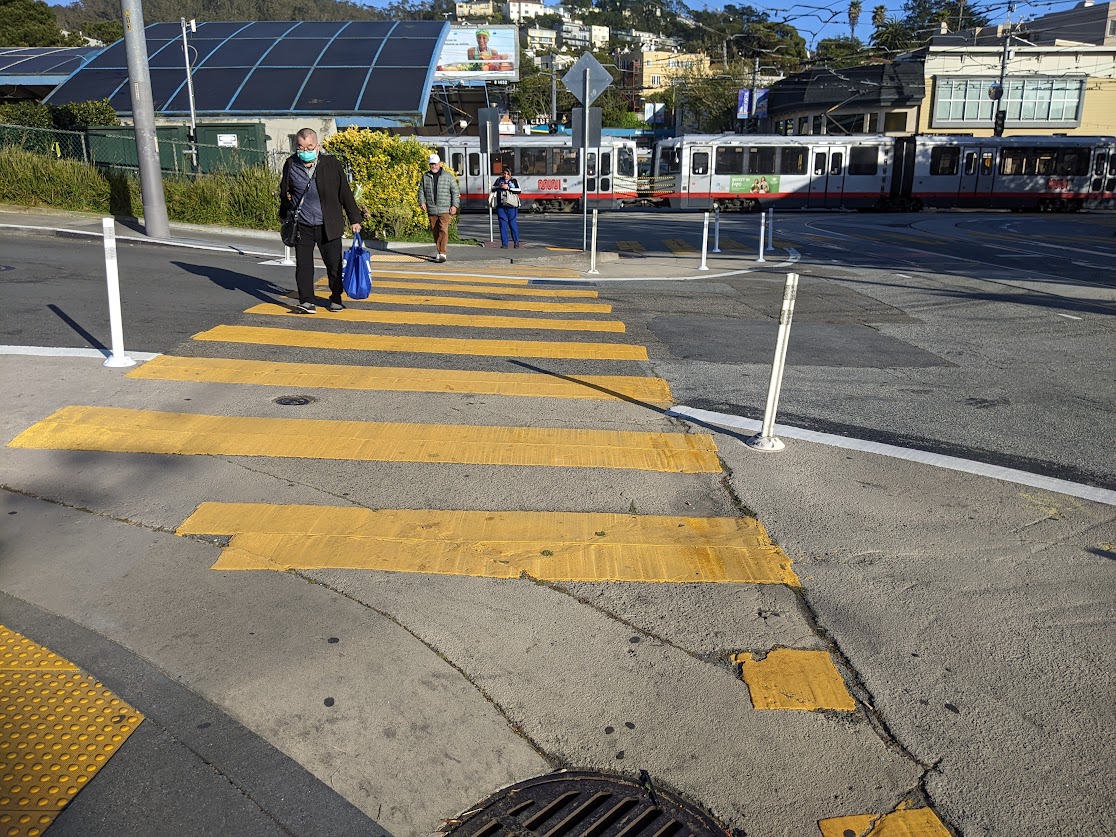Report: SFPD’s New Approach to Crime on Muni “Promising”
10:08 AM PDT on June 15, 2010
 The Ingleside station district saw the greatest spike in Muni crime of any police station district in the city during the last several years. Image: City Controller's office.
The Ingleside station district saw the greatest spike in Muni crime of any police station district in the city during the last several years. Image: City Controller's office.Until a year ago, there was no written agreement between Muni and the city's police department specifying what services Muni was paying for and how much, despite the fact that the police department was sending the San Francisco Municipal Transportation Agency an $83 million annual bill.
Now, one year after a formal memorandum of understanding (MOU) between the departments was finally released, the City Controller's office has released a report that looks at the patrolling services SFPD is providing in a district that is both the location of a dramatic spike in Muni-related crime and also a potential model for how SFPD can reduce such crime.
The report, entitled "Addressing Crime and Disorder on the Municipal Railway: A Case Study on Data-Driven Policing in the Ingleside District," focuses on the efforts of Ingleside Captain David Lazar to overhaul and strategically target how police are assigned to Muni during their shifts.
The SFPD's Bus Inspection Program, or BIP, which was formally outlined in the 2009 MOU but has been around much longer, requires each sergeant in a patrol division and each officer "assigned to a radio car" to make two transit inspections per shift. Officers on foot patrol are required to make at least four inspections per shift.
But the BIP agreement doesn't give any direction for how officers should choose the time and location of their trips, and for many people who ride Muni, it came as a surprise that officers are required to ride at all, since they have been such a rare sight.
The Controller's report concludes that "the issue with the Bus Inspection Program was that the times, routes, and locations were left to the officers' own discretion which likely contributed to the public's perception about the lack of police presence on the transit system." There's even been widespread suspicion that many officers haven't even met that bare requirement, prompting a pilot program to track their rides using TransLink cards.
For now, the MOU still only requires SFPD to meet the two-inspections-per-shift requirement. But Lazar, working with the Controller's office, developed a new inspection program in the Ingleside, called Operation Safe Muni, based on multiple data sources and community input. Lazar began assigning officers to high-problem transit lines and times, instead of allowing them to simply ride whenever they wanted to.
 Image: City Controller's office
Image: City Controller's officeThe City Controller's office called the results of the program, which launched in October and includes both regular patrols and sting operations, promising.
"While it is too early to know if the strategies employed by the district are having the intended impact of reducing crime and fear, there are promising signs," the report notes. "A comparison of Muni incident data for December 2008 and December 2009 shows that vandalism -- the crime reported most frequently on Muni in December 2008 -- was not reported at all in December 2009. Moreover, the two bus lines that were targeted by the Ingleside -- the 8X San Bruno Express and the 14 Mission -- dropped from being the first and second most problematic lines to the third and fourth."
The Ingleside police station began targeting deployment based on City Survey results, resident focus group results, and security incident data reported by Muni operators. That City Survey data showed that Ingleside was not only the second-most dangerous for riding Muni in the view of residents, it was also the district where the feeling of safety was dropping most rapidly, with 38 percent of residents feeling safe on Muni in 2005, and just 31 percent feeling safe by 2009.
The neighborhood focus groups also pointed to crime on Muni as a major concern in the Ingleside, as did complaints from concerned residents, and Muni operator incident reports confirmed the public's perception that crime on Muni was getting worse.
Oddly enough, the report finds, SFPD didn't notice the spike in Muni crime before because it's still a relatively small volume of the city's total crime.
Fare Inspection Concerns
One of the key changes in how Ingleside officers did Muni inspections also became a source of controversy as it rolled-out citywide.
Instead of just riding the buses, officers began checking proof-of-payment from riders, on the theory that minor violations were creating a sense of disorder that invites more serious crime and creates a sense of fear. Officers made five outstanding-warrant arrests in October through December of last year as a result, and the City Controller's office report called the tactic "more effective at fighting crime because [officers] can verify if someone has an outstanding warrant for a previous crime or is carrying a weapon."
The principles of Operation Safe Muni have now been expanded citywide, but that central component -- fare inspection by SFPD -- has been suspended for several months until concerns that the inspections are really about immigration can be addressed.
"I don't know the whole story yet, but [the crime] may have eased as a result of our complaints that we want the police to do their police work and to target it, and people to check the fares, but not to intimidate them to the extent that some of them were afraid to ride buses," said Marlene Tran, spokesperson for the Visitacion Valley Asian Alliance. "That was terrible."
 Click to enlarge: Ingleside police station used community responses to help target enforcement. Image: City Controller's office.
Click to enlarge: Ingleside police station used community responses to help target enforcement. Image: City Controller's office.Still, for the most part, the report confirms what SFPD Chief George Gascón concluded when he expanded Operation Safe Muni to the entire police force: the data-driven, targeted police assignments are much more effective than the haphazard, loosely enforced patrol requirements required by the BIP.
The Controller's report suggests that the SFMTA should provide regular Muni operator security reports from the TransitSafe database to the SFPD, that the two agencies should implement a public service campaign about crime prevention on Muni and the importance of reporting all crime incidents, and that the SFPD should formalize a proof-of-payment fare inspection training program to make sure it's consistent across all departments.
Lazar has since been assigned to help deal with the mess at SFPD's crime lab, and is no longer head of Ingleside station, but a new formal order from Gascón has ensured that the Ingleside approach will be used department-wide. According to the Controller's report, the order requires "all police districts to provide crime prevention and enforcement on Muni based on analysis of crime, community complaints, and Muni operator concerns."
"This is the most significant change in how the SFPD patrols the transit system in over a decade," it notes.
The SFMTA Board will discuss the report at its meeting today, which may provide more insight into whether the SFMTA shares the City Controller's assessment of the program.
Stay in touch
Sign up for our free newsletter
More from Streetsblog San Francisco
SFMTA Starts West Portal Outreach
Agency presents plans to block traffic from crossing in front of the train station




